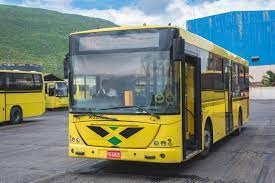OPPOSITION spokesman on transport Mikael Phillips has blasted the Andrew Holness-led Government over its handling of the transport portfolio, in particular its management of the Jamaica Urban Transit Company (JUTC).
"Bad policy, political interference, and lack of vision are killing Jamaica's transport sector, and the bad old days of the 1980s are back with us," Phillips said on Tuesday as he made his contribution to the 2023/24 Sectoral Debate at Gordon House.
Promising that a new People's National Party (PNP) Administration will overhaul the problem-plagued and cash-starved JUTC, Phillips declared that "we need a new direction for urban and rural public transport".
He highlighted that 20 years ago, "we (the PNP) had a new vision when the JUTC was established to offer the commuting public a first class transportation system with the vision of a modern, efficient, safe, and cost-effective service.
"We moved away from a ramshackle transport system of the 1980s but, sad to say, we are right back there."
Phillips argued that a new direction is badly needed to take Jamaica's transport sector forward so as to achieve global standards. He said that any transport study will indicate that governments give public transport the same priority as all other societal functions because it is a reasonable reflection of the overall society and can influence the priorities of the country.
"Public transport must have sustainability, values, benefits, and capacity," he said.
The Opposition spokesman acknowledged that there is no short-term fix, noting that the public transport system needs medium-and long-term plans of five to 10 years "to get us out of the mess" and restore the vision and mission of 20 years ago, for the Jamaican people.
"The plan must involve all players in the sector together, representing the taxi associations, the JUTC, Transport Authority, the police, the private sector, and the Government. Everyone must be at the table presenting their inputs and developing this plan that — no matter which Administration comes to office — there will be a road map to an improved, if not ideal, national public transport sector for the country," Phillips said.
He also declared the Kingston Metropolitan Transport Region (KMTR), where the JUTC mostly operates, to be in a quagmire and in urgent need of attention.
He said that in 2016 there were 2,000 hackney carriage licences in the KMTR, ballooning to 7,000 by 2022 in Kingston and St Andrew alone.
"That is why we are bursting at the seams — safety is compromised, driving habits are dangerous, and there is no infrastructure to accommodate this increase of over 300 per cent," Phillips declared.
Insisting that the system must be urgently rationalised, Phillips pointed out that most hackney carriages operate like route taxis, contrary to their licenses.
"There are limited parking locations providing a safe environment for operators and commuters, [with drivers] in the process of picking up and setting down [passengers], poor governance from the regulator, and little or no policy direction from the Government on the crisis," he stated.
Phillips also questioned whether there was a need to go back to the franchise system in the KMTR and asked "how will the JUTC manage routes it has abandoned?".
He also wanted to know what percentage of the 120 routes is the JUTC able to service adequately and how the hilly routes will be serviced with limited resources.
"Public transport needs policy and leadership to manage this deep crisis. Time come for a new direction," he said.

